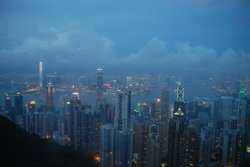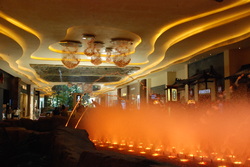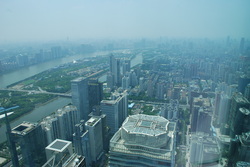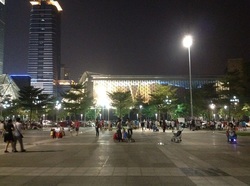
Hong Kong from the Peak (August 2012)
Within 5 weeks of staying in Hong Kong while also visited Macau, Shenzhen, and Guangzhou, gradually I gain a personal insight of how fast the development in China. Things could be different if I merely stay here as a tourist, but I am here as one of the many PhD students and researchers where we share our experiences together. Many of my friends come from mainland China and for the first time, I learn about provinces in China that I am not familiar with. Places such as Xin Jang, Fujian, Harbin, and Tibet.

Macau, the old Colonial Buildings (August 2012)
Hong Kong University is considered to be the best one in Asia and rank number 30 something in the world according to some of media resources. I tend not to pay attention to the rank and try to be more mindful whether I can connect well with my supervisors or choose the right research topic. Yet, HKU reputation becomes the driving force of many best Chinese students and also local students from Hong Kong to choose to study at HKU or get recruited by HKU. Through conversations with my mainland Chinese friends, I get to understand that many of them want to go back to their provinces and help the situation there. It is a very noble reason and I admire such attitude. I also get to learn further about the real situation in China that the educational resources and development is still rather un-equal. While, the typical way of climbing the ladder in society is for those in rural areas to go the cities in trying their luck I do not think this is the best or most strategic method of upward mobility. Many of the people from the rural areas want to enjoy the glimpse of development, but urbanization may not be the answer. Perhaps, it is best to develop their own villages by bringing experts to their rural areas.

Macau, inside the Galaxy hotel
I am not a professional in rural area research but from my limited understanding of city planning (I've taken a few classes in the past as minor at UC Berkeley), the problems in cities will get worst with more people come and fight for the resources. I wonder why not share some knowledges and invest to build the infrastructure in the rural areas/villages. Isn't today society starts to appreciate sustainable design and so eager to build green building. What can be more green than living humbly in the village, grow their own food, eat organic food from the backyard, and co-exist with the nature. Perhaps, the gimmick will be to do something a bit modern in the village whether it is structural or educational. At the same site, I believe it shouldn't be to modernize the village to have more skyscrapers like Hong Kong, Shanghai, Japan, or Singapore.

Guangzhou from Four Season Hotel 70th floor
It is so crucial to get the right mindset in thinking about development or else we will create more un-equal development and increase the disparity of the have and the have-nots. United States experience this in a very severe way. Perhaps, not too many people in other part of the world know because they get to learn about the U.S from the popular media and watch some kind of abc show that depict only the middle to upper income life-style or even worst the celebrities life. The real american life is hard and we can even find many homeless living in the same street in San Francisco.

Shenzhen at Children Place (Sept 2012)
One day, I realized that along the same street you can find the tenderloin area (the place where there are many poor and homeless people) and in this same street you can find the nicest apt in the city as well. This is an irony….in the developing countries, you can have shacks or squatters somewhere in the corner of the cities and in the developed countries, you can have shelter but if you don't even have the ability to apply for one, you'll end up being homeless. Development can be good, but it can also be cruel. I hope that through research and collaboration, we can make the world into a better place to live. Not just some kind of empty promises or nice words to say, but truly to take such thinking to heart because we will have to pass on this world to the future generation and they deserve to have a better place to live.
NOTE: As for those who want to learn further about the other part of China (the rural area), I happened to find an interesting research project called Rural Education Action Project. This project is mainly sponsored by Stanford University collaborating with several Universities from mainland China. Here's REAP link: http://reap.stanford.edu/
(you can click some of REAP videos and witness the other side of China, the rural ones: those who are left behind from the rapid development that mostly are happening in the cities)
(you can click some of REAP videos and witness the other side of China, the rural ones: those who are left behind from the rapid development that mostly are happening in the cities)



 RSS Feed
RSS Feed
